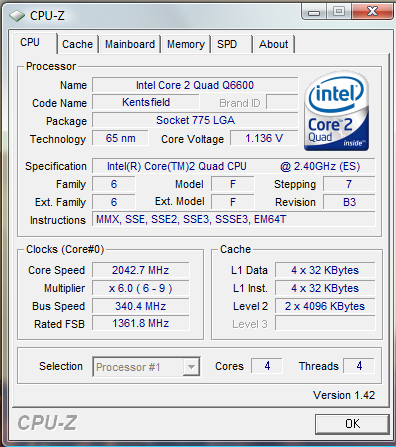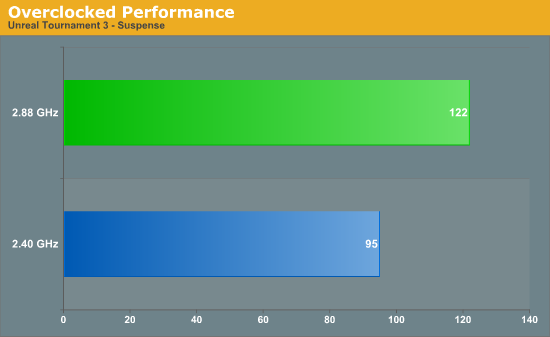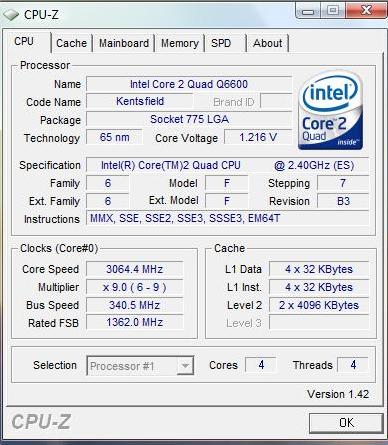Shuttle SG33G5: Black Beauty or Black Sheep?
by Matt Campbell on December 13, 2007 12:02 AM EST- Posted in
- Systems
Overclocking
Remember that small margin of overhead discussed in the Power section? It's about to be tossed out the window. To recap, a few issues hinder performance and overclocking capability in this small form factor system. The primary limitation is the 250W power supply. Even at stock speeds, we've already seen that the system is practically at maximum specified draw.
A secondary limitation is heat. It's not practical to use alternate cooling solutions in a system like this (though if you're determined it's possible). The temperature measurements don't seem to indicate that will be a huge problem. The third potential limitation is the lack of control over the memory divider, which might artificially limit the system. If you're utilizing DDR2-667, it's already at full speed at a 266MHz FSB with the 4:5 divider.
For overclocking, the first step was to reduce the multiplier and see how high we could push the FSB.

The maximum we achieved was 340MHz. We could run the memory in either 4:5 or 2:3 in this configuration and it was stable. Thus a 510MHz threshold was established for the memory, which removes it from the equation (at a 4:5 setting, the memory could surpass a 400MHz FSB). 350MHz failed to pass the Windows boot screen at stock voltages.
Next, we dropped the FSB to 320MHz and raised the multiplier back to 9. This 2.88GHz speed was stable at stock voltages. We ran the UT3 CTF benchmark, Suspense, at this speed.

This mild overclock yields a solid 27 FPS performance increase in UT3. As previously mentioned, however, we saw no improvement at all in Crysis, as the GPU is clearly the bottleneck for that title.
So what about that margin we had? We monitored power during the UT3 run, and it spiked as high as 231W. We then stressed the system using CINEBENCH multi-render and 3DMark06. The result was a 260W average draw. Danger, Will Robinson! At this clock speed with the 8800 GT, we're exceeding the maximum power rating of the supply - at least at the outlet. Hmm… maybe just a little more peril?

We raised the FSB to 340MHz with a multiplier of 9, for a resulting clock speed of 3.06GHz. The system would boot into Windows and run Prime95 for a short period, but CINEBENCH and 3DMark06 caused a fatal crash. Increasing the CPU voltage by 100mV stabilized the system. However, when CINEBENCH and 3DMark06 stressed the system to 100%, the power draw immediately spiked to 286W. If we figure efficiency at around 80%, the 250W PSU is putting out 230W, but without precise control over where this power is going, we felt it was prudent to stop the test.
All the components (CPU, memory, and motherboard) were capable of stability at this speed and likely higher, but running a 250W power supply at such a load for prolonged periods is unlikely to prolong component life. In fact, our experience with many previously tested SFFs is that motherboard and PSU problems are common even without overclocking after 12-18 months. We certainly don't recommend overclocking on SFFs unless you're willing to risk failures - and such failures appear to be common given enough time, unlike many desktop systems that we've run overclocked for years on end without difficulty.










16 Comments
View All Comments
complectus - Thursday, December 13, 2007 - link
What is the point of showing graphs of performance figures without anything to compare them to? Are we supposed to have committed to memory a range of Cinebench results so we know where this product stands?JonathanYoung - Thursday, December 13, 2007 - link
I, too, have had negative experiences with Shuttle. One of the worst offenders was their KM400 model. On paper, it supported 333MHz FSB Athlon XPs, but I never found one that could. It was obviously a Shuttle problem because 1) regular ATX KM400 boards supported 333MHz AXPs and 2) there were tons of other users who had the same problem (there was a huge thread over at Sudhian for awhile).To sum it up, Shuttles look nice and appealing, but their QC leaves a little to be desired.
Flunk - Saturday, December 15, 2007 - link
I have a shuttle with a KM400 chipset too and it is currently working just fine with a barton 2500+ processor. One thing though, the board has a physical jumper on the board that you must set to change the FSB, it is listed in the manual. Perhaps you have a similar issue?retrospooty - Thursday, December 13, 2007 - link
I have a shuttle sk43g with K400M chipset. I bought it used, and built it for my son, and it has been working for well, overclocked on the 333mhz bus for over 3 years... In the Arizona heat. Never an issue, never a problem with it at all, and he is often on all day and 1/2 the night. Maybe you just had a bad one.Frumious1 - Thursday, December 13, 2007 - link
My experience with Shuttle SFFs has been ... poor would be a kind way of putting it. We sold these at the computer shop I work at for a while. All was fine for about six months, and then the stupid things started coming back! I bet more than half of them came in for repairs within the two years. Needless to say, we don't carry SFFs anymore.These were the socket 939 models (SN95G5), so maybe the newer ones are better, but they appear to use the same old power supplies. Oh, and these 939 units somehow didn't work with X2 chips when those came out. Anyway, the PSUs were the point of failure most of the time.
I'll stick with regular PCs, thanks. Cheaper, quieter, AND more reliable! Three strikes, Shuttle. You're out.
sprockkets - Friday, December 14, 2007 - link
Out of curiosity, did those systems have the Shuttle branded power supplies or HiPRO? All the OEMs seem to like HiPRO now for simple reasons: They are complete crap and cost less.But hey, I make $60-$240 labor having to replace the power supply which killed the motherboard which then usually requires a OS reinstall, so I guess Dell, HP, Shuttle and others can keep using them.
No pictures of the inside? WTF?